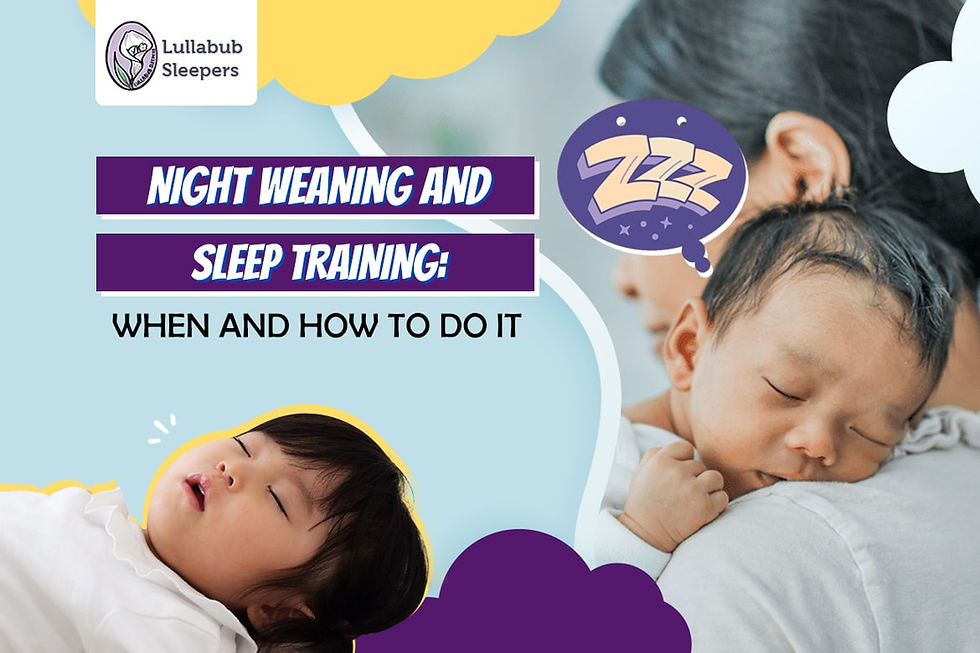Night Weaning and Sleep Training: When and How to Do It
- bharathi24
- Sep 23, 2025
- 3 min read

SIt’s 3 a.m. in your Singapore flat. You’ve just finished another feed, and as you lay your baby back down, you wonder: Does he really need this feed, or is he just waking out of habit?
As a certified baby sleep coach, I hear this question constantly from tired parents. The truth is, while newborns absolutely need night feeds for growth, there comes a point where night weaning can help your little one (and you!) sleep longer stretches.
In my practice, my general rule is to wait until your baby reaches 6 kg or 6 months old—whichever comes first—before night weaning begins. By then, most babies are physically ready to take in enough calories during the day to sustain longer night sleeps.
Let’s talk about what night weaning is, how it works with sleep training a baby, and how you can gently transition your baby toward independent sleep.
What Is Night Weaning?
Night weaning is the process of gradually reducing or removing nighttime feeds so your baby can learn to sleep longer stretches. It doesn’t mean cutting out all feeds overnight in one go. Instead, it’s about shifting calories to the daytime and teaching your baby to resettle without always needing milk.
For many parents, night weaning and sleep training a baby go hand-in-hand. Once babies are developmentally ready, reducing night feeds supports better sleep training results.
Signs Your Baby May Be Ready for Night Weaning
Every baby is unique, but here are some readiness cues I look for as a baby sleep coach in Singapore:
Baby weighs 6 kg or more (or is around 6 months old).
Pediatrician confirms healthy growth and weight gain.
Baby takes full feeds during the day but still wakes often at night.
Baby wakes and feeds for comfort, not hunger (feeds last just a few minutes).
Parents are ready and consistent enough to support the transition.
Night Weaning vs. Sleep Training a Baby
While closely related, they’re not exactly the same:
Aspect | Night Weaning | Sleep Training a Baby |
Purpose | Reduce night feeds to shift calories to daytime | Teach baby to self-soothe and sleep independently |
Focus | Feeding schedule | Sleep skills and routine |
Age to Start | Around 6 kg or 6 months | Varies, but often 4–6 months depending on readiness |
Tools | Gradual feed reduction, resettling techniques | Consistent sleep routines, gentle soothing strategies |
Role of Parent | Provide reassurance without offering full feeds | Guide baby through sleep transitions consistently |
As you can see, night weaning often complements sleep training a baby—especially when handled gently and consistently.
Gentle Methods for Night Weaning
Here are strategies I often suggest as a baby sleep coach in Singapore:
Gradual Feed Reduction
Reduce the amount of milk (for bottle-fed babies) or shorten breastfeeding sessions by a few minutes each night.
Stretching Intervals
Slowly increase the time between feeds. For example, if your baby usually feeds every 3 hours at night, aim for 3.5–4 hours.
Offer Comfort Without Feeding
Use patting, rocking, or shushing to soothe instead of feeding every wake-up.
Daytime Calorie Shift
Ensure your baby gets enough feeds and solids (if age-appropriate) during the day so they don’t need extra calories at night.
Common Night Weaning Mistakes to Avoid
Rushing too soon. Starting before baby is ready can backfire and cause stress.
Being inconsistent. Some nights weaning, some nights not, confuses babies.
Replacing feeds with new crutches. Rocking or carrying to sleep every time only swaps one habit for another.
Not considering growth spurts. During growth spurts, babies may genuinely need extra night feeds temporarily.
Final Thoughts: Balancing Night Weaning with Sleep Training
Night feeds won’t last forever—but knowing when and how to begin night weaning makes all the difference. When approached with consistency, reassurance, and a clear plan, both you and your baby can enjoy more restful nights.
If you’re struggling with night weaning or sleep training a baby, you don’t have to do it alone. As a certified baby sleep coach in Singapore, I work with families to create gentle, personalized plans that suit their baby’s needs.
👉 Explore My Services and let’s make restful nights a reality for your family.
FAQs
When should you start night weaning?
Most babies are ready around 6 kg or 6 months old, but always confirm with your pediatrician.
How do I night wean gently?
Reduce the amount or length of feeds gradually, while soothing your baby back to sleep in other ways.
Does night weaning affect milk supply?
If you’re breastfeeding, supply adjusts to meet daytime demand. Nursing more in the day helps maintain supply.
Can night weaning improve sleep?
Yes. When babies no longer expect feeds at every waking, they learn to self-soothe and sleep for longer stretches.
Do all babies need night feeds at 6 months?
Not always. Some still require 1–2 feeds, while others can sleep through the night. It depends on individual growth and readiness.



Comments